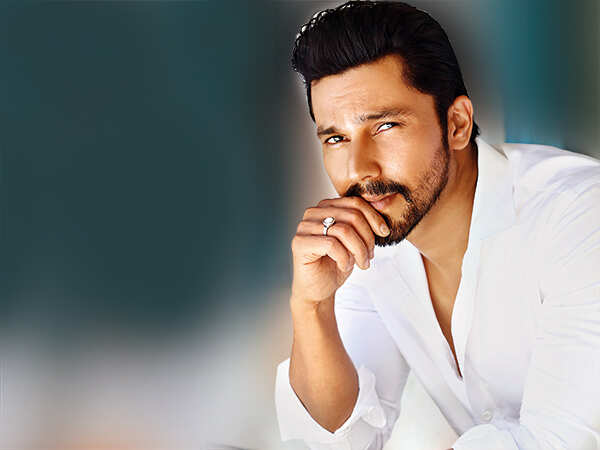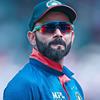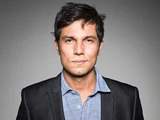Randeep Hooda: I went through a dark phase, but I came through
Actor Randeep Hooda gave almost three years of his career to a passion project that didn’t see its completion. To get over something that you are so invested in isn’t easy. However, like his home, which exudes peace and zen-like calm, he, too, seems positively cut off from the noise and nature of the world, which thrives on the endless rat race. In a chat with BT (we must add, it took the philosophical route), Randeep tells us how the dark phase in his life helped him evolve as a person, and how being disconnected from the world of instant gratification, vanity and social media frenzy can actually help. Excerpts:
You have a slew of interesting projects lined up with people like Imtiaz Ali, Mira Nair and actor Chris Hemsworth, but you almost went incognito for close to three years. What were you up to?
I have taken breaks before, but this was perhaps the longest since the time I started to matter. While I was away, I discovered new ways of approaching life. I went to the Golden Temple (Amritsar) and took an oath not to cut my hair till the movie (Battle of Saragarhi) reached its completion. Through the course of working on that film, I found more meaning to life than just being an actor. I always wanted to know more about life beyond the movies. I got to pursue that… be it wildlife photography or nature conservation. I did seva, along with other things, which I didn’t have the time to do earlier. I was doing four films a year before that, so I was fortunate to get this time for myself and explore other things.
Looks like it was a life-altering experience... As an actor, it is harder to get the right opportunity, than to execute it well. I completely lost my sense of vanity and I am trying to be a better person. With the long beard and hair, I unlearned what it is like to behave like an actor. I explored the depths to which you can go to become someone else all over again after Sarbjit (2016). For that film, I gave a few months, but for Saragarhi, I almost gave three years of my professional life. The film didn’t happen, but nonetheless, it was a great experience for me.
Talking about Battle of Saragarhi, you even shot a certain portion of that film. So, what happened after that? The Akshay Kumar-starrer, Kesari, was inspired by the same historical event. Was that the reason why your film came to a halt?
We shot about 30-40 per cent of the film. We had started much before Kesari took off. In fact, I congratulated Akshay Kumar when Kesari was announced. They were different films, though the premise was the same. Every film has its own vision, so Kesari wasn’t an issue. Our director was Rajkumar Santoshi, who has made some inspirational films. He may be able to answer this question better. Everything fell into place and then fell apart. I don’t know if I want to go back to that. There were various factors. If things have to happen, they find a way. I am raring to do more work now (smiles).
Two films can be made on the same topic. Do you think the makers buckled under the pressure of a similar commercial film and hence, decided to drop the idea of making it?
They never told me that they are shelving it (laughs!). I let go of a lot of work to do this film, but I wasn’t in charge of it. I was just an actor, and making a film is not an actor’s call. I don’t think that the film buckled under pressure, and there were no creative differences either. It felt conspired. A lot of things happened. Like I said, every film has its own destiny. It’s not stalled in spirit, though. I have taken it in my stride. If I look back, I went through a dark phase, but I came through. I got forged into the fire for a better future. That is how I see it. You have to look at the positives. I have always been in awe of actors who can transform on screen — Joaquin Phoenix, Christian Bale, Daniel Day-Lewis. This film was a great lesson in transformation.
When did you finally decide to let go?
I couldn’t abandon the film as I was literally living that character. The day I shaved off my head to shoot my upcoming film with Chris Hemsworth, that day it was over for me. I went to the Gurudwara and sought maafi as I had vowed that I won’t shave my head until that movie was completed. I was in tears when I shaved off my head and beard. I have kept that hair with me. For this film, I gave it my all.

Was that the darkest phase of your career?
Not at all. Yes, it affected me the most and taught me a lot for the better. When you get into the habit of jumping from one character to another, your passion starts feeling like work. Yes, acting is work — it is a way to earn money and keeps you relevant, but for me, it’s always more about the experience of playing different people and exploring our nature as human beings. When I started my film career, I used to do one film a year. I actually believed in the over-abused term — method acting. This phase made me think about why I got into acting in the first place. I distinctly remember, while studying I also drove cabs in Australia for three years in night shifts, which became my groundwork for acting as people get into your cab and forget that you are there. They think aloud, talk to each other or on phones and through that, you get to know a lot about people and their lives. I realised at that point that if I had to choose a career in life, it had to be something I loved. My dislike for the mundane led me to acting and that feeling still holds. Acting does become about lunch breaks and call times eventually, but it’s still fascinating.
We hear even the film ’83, based on India’s World Cup win (which Ranveer Singh is now doing with a different director), and Shahid Kapoor’s role in Padmaavat were offered to you, but you didn’t make the final cut...
The films I didn’t do were not in my destiny. It doesn’t affect me. I have had many such missed opportunities, and roles that I almost did, but were pushed under the carpet. I turned down some roles and some didn’t work out, but you can’t mull over such things. You have to focus on what you have in hand. Sanjay Puran Singh Chauhan (who made the film Lahore) was to direct ’83, but it fizzled out. I wish Ranveer well.
Sarbjit is one of your finest performances till date. There are many who feel that you didn’t get the level of appreciation or awards you deserved for the film...
I have never been a favourite for awards. I have not toed the line in a lot of ways that you are perhaps expected to in this industry. I also feel that it’s in bad taste to sit here and say that I didn’t get an award for this or I wasn’t appreciated for that. You just have to move on. I remember I was noticed for my performance in Jannat 2 (2012). All of a sudden, people wrote great things about me. I was shooting for other films and I started to do certain things in those films because of that appreciation. I thought that this is what people want. I called up Naseer bhai (Naseeruddin Shah) and said, ‘Uss part ka mayil main yaha dho raha hoon’. He said, ‘There is this monastery in the Himalayas where monks make structures out of sand. They complete it, look at it and then kick it. Then they make another one. You have to do that.’ I have tried not to repeat what I thought had worked for me. I don’t know how much of it comes across, but I have tried to differentiate every part. By that, I don’t mean changing hairstyles and belts, it goes deeper than that. Recognition is a funny thing. You have to reach a place where you and your loved ones are happy with what you have done. The rest is an exercise of manipulation of thoughts, the impression you project or how you sell yourself as an actor. I am not good at that.
Be it beach clean-ups, helping flood-affected people, wildlife conservation, or spreading awareness about water crisis... you are constantly doing your bit for the society. Does this make you feel more real, more alive?
When you read the news, you feel that everything is bad in the world. That frustrated me. There are so many good people, who don’t get written about. You can’t change the world, but sometimes, doing one good thing is enough. Do your bit. It makes you feel ki aaj kuch kiya hai. You will not get that feeling by going to the gym. I truly believe that our self-centred approach to life makes us feel empty. When I was learning about seva, I realised that there’s so much to do. Also, you cannot exhaust your resources. You need to rebuild it by working in your professional space, so that you can help others. You are mortal, so you should do your bit while you can. It keeps you real. If you are real in life, it reflects in your performances as well.
You have now taken to photography... Is it your way of looking at life through a different lens?
Yes, I have bought myself a fancy camera. It’s also a way of spending more time in the wild. That’s another excuse to get away from the instant gratification and sense of self-importance that social media gives you. Everything is fast now. It’s a struggle to be honest and find honesty today, within yourself, your work and amongst people.
https://timesofindia.indiatimes.com/entertainment/hindi/bollywood/news/randeep-hooda-i-went-through-a-dark-phase-but-i-came-through/articleshow/70449427.cms?from=mdr
































comment:
p_commentcount